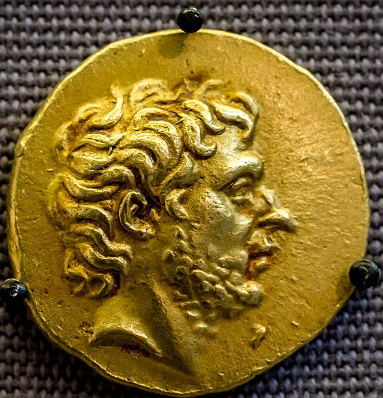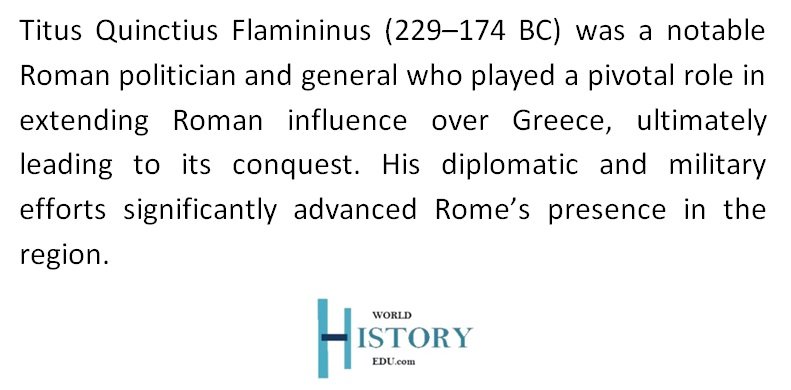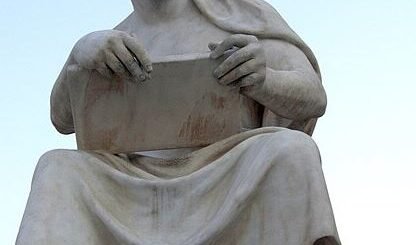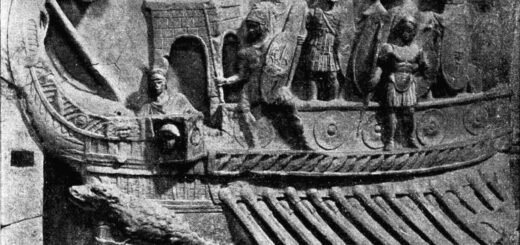Titus Quinctius Flamininus: The Famed Roman General and Politician
Titus Quinctius Flamininus, a distinguished figure of the late third and early second centuries BC, played a pivotal role in establishing Roman influence in Greece and setting the stage for Roman domination in the eastern Mediterranean.
His career is notable for the combination of military skill, political diplomacy, and cultural affinity he demonstrated toward Greece, which brought a new era of Roman intervention and control in Hellenistic affairs.
Born into a noble but somewhat diminished patrician family, Flamininus rose to prominence through a series of exceptional appointments and campaigns, culminating in his critical role in the Second Macedonian War and his liberation proclamation at the Isthmian Games.
Early Life and Family Background
Flamininus was born around 228 BC into the minor patrician Quinctia family, a lineage that had enjoyed considerable influence in early Rome due to prominent ancestors like Lucius Quinctius Cincinnatus.
However, by the time of Flamininus’ birth, the family had lost much of its political clout. His great-grandfather, Caeso Quinctius Claudus, had served as consul in 271 BC, marking the last time a Quinctius held a high office until Flamininus’ rise.
Despite this decline, the Quinctii retained strong connections to Rome’s religious and cultural traditions. Flamininus’ grandfather, Lucius Quinctius, had served as flamen Dialis, or high priest of Jupiter, establishing a link to the Roman religious elite. This religious role is thought to have influenced the cognomen “Flamininus,” emphasizing the family’s heritage within Rome’s spiritual hierarchy.
Flamininus’ father, also named Titus, remains a relatively obscure figure, but the family’s influence resurged through Flamininus and his younger brother, Lucius, who became an augur by 213 BC. His uncle, Caeso Quinctius Flamininus, contributed to the family’s resurgence by commissioning the Temple of Concord in 217 BC. Family alliances, especially with the influential Fabii, provided Flamininus with critical support early in his career.
According to the historian Polybius, Flamininus likely married into the Fabii family, strengthening his ties to the powerful aristocratic network in Rome. Quintus Fabius Buteo, an influential figure within the Fabii family, is even believed to have been his nephew by marriage.
Early Military Career
Flamininus’ military career began during the Second Punic War, in which Rome struggled against Hannibal’s forces in Italy.
In 208 BC, Flamininus served as a tribunus militum, a junior officer, under Marcus Claudius Marcellus, a general who led Roman forces against Hannibal in southern Italy. Under Marcellus’s command, Flamininus gained valuable battlefield experience, though Marcellus’ untimely death in an ambush in 208 BC cut short his service.
Following Marcellus’ death, Flamininus quickly ascended through the ranks. By 206 BC, he had attained the position of quaestor, a notable advancement in Roman public life. Shortly after, around 205 BC, he received an exceptional appointment as propraetor of Tarentum, a key Greek city in southern Italy that Rome had recently reclaimed from Hannibal. His assignment to Tarentum, despite his young age, reflected Rome’s need for capable commanders familiar with Greek culture.
Flamininus excelled in his role, cultivating relationships with the Greek population and expanding his knowledge of Greek customs and language, which would serve him well in his later diplomatic engagements with the Hellenistic world.

Flamininus was instrumental in Rome’s conquest of Greece. Image: Gold stater of Flamininus located the British Museum
Political Advancements and Consular Campaign
Following the Second Punic War, Flamininus continued to serve the Republic in various administrative roles. In 201 BC, he joined a ten-member commission responsible for settling Scipio Africanus’ veterans in southern Italy, a reflection of his growing influence. The following year, he served on a second commission tasked with enrolling settlers in Venusia, an unusual dual appointment that highlighted his versatility and the Senate’s confidence in his abilities.
In 199 BC, still in his late twenties, Flamininus launched an ambitious bid for the consulship. His candidacy was unconventional, as he had bypassed the typical prerequisites of the cursus honorum, including the praetorship or aedileship. Two tribunes of the plebs, Marcus Fulvius and Manius Curius, attempted to block his candidacy, arguing that he was too young and inexperienced.
However, the Senate intervened, compelling the tribunes to withdraw their objections, and Flamininus was elected consul alongside Sextus Aelius Paetus Catus. His swift ascent suggests he had influential backers, possibly within the Fabii or other patrician circles, who supported his rise to power.
The Second Macedonian War and the Proclamation of Greek Freedom
Upon taking office in 198 BC, Flamininus was assigned the prestigious command in the Second Macedonian War against Philip V of Macedon. This conflict was part of Rome’s broader strategy to curtail Macedonian influence in Greece, which was seen as a threat to Rome’s allies in the region.
Flamininus quickly demonstrated his military acumen, leading Roman forces to a series of victories that forced Philip’s troops to withdraw from southern Greece. One of his early successes was the Battle of the Aous, a confrontation in which he skillfully outmaneuvered the Macedonian forces, securing a significant strategic advantage.
As his consular term came to an end, Flamininus was granted an extension of his command as proconsul, enabling him to continue the campaign. In 197 BC, he achieved a decisive victory over Philip at the Battle of Cynoscephalae in Thessaly. This battle marked a turning point in military history, as it demonstrated the superiority of the Roman legion over the traditional Macedonian phalanx, solidifying Rome’s reputation as a formidable land power. Philip V was forced to capitulate, ceding control over Greece and paying a substantial indemnity to Rome. However, Rome allowed Philip to retain his kingdom as a buffer state, a strategic decision that balanced Greek autonomy with Roman security interests.
In 196 BC, Flamininus proclaimed the freedom of the Greek states at the Isthmian Games in Corinth, an act that resonated deeply with the Greek populace. Fluent in Greek and a genuine admirer of Greek culture, he was celebrated by the Greeks as a liberator and was even deified in some cities. The Greek cities minted coins bearing his image, and his declaration was greeted with widespread enthusiasm. This act of “liberation” exemplified Flamininus’ diplomatic tact and solidified his legacy as a champion of Greek autonomy under Roman protection.
Diplomacy and Later Career
Despite his affinity for Greek culture, Flamininus was a pragmatic diplomat who prioritized Rome’s interests. His actions in Greece were part of a broader strategy to secure Rome’s influence in the region and prevent the emergence of a dominant Hellenistic power.
In 192 BC, Flamininus was called upon again, this time to address the rising threat of the Seleucid king Antiochus III, who was encroaching on Greek territory. Eumenes II of Pergamum, an ally of Rome, appealed for assistance, and Flamininus led the negotiations, warning Antiochus to refrain from interference in Greek affairs.
However, Antiochus dismissed Flamininus’ authority, challenging Rome’s role as Greece’s protector. This diplomatic impasse contributed to the outbreak of war between Rome and the Seleucids.
In 191 BC, Flamininus was present at the Battle of Thermopylae, where Roman forces, with his involvement, defeated Antiochus and secured Rome’s supremacy in Greece. This victory reinforced Rome’s position in the eastern Mediterranean and curbed Seleucid expansion, allowing Rome to consolidate its influence over Greece.
Censorship and the Pursuit of Hannibal
In 189 BC, Flamininus achieved another prestigious position when he was elected censor alongside Marcus Claudius Marcellus. The role of censor allowed him to exercise significant influence over public morality and infrastructure, though specific details of his reforms remain obscure. His election to the censorship further cemented his standing within the Roman elite.
One of the most controversial episodes of Flamininus’ later career involved his role in the pursuit of Hannibal, the famed Carthaginian general.
In 183 BC, Flamininus was dispatched to negotiate with Prusias I of Bithynia, where Hannibal had sought refuge. Determined to prevent Hannibal from becoming a threat to Rome, Flamininus pressured Prusias to surrender him.
Facing inevitable capture, Hannibal committed suicide. Although Flamininus had acted to secure Rome’s interests, some Roman senators criticized him for pursuing an old enemy who was no longer a danger. This episode marked a complex moment in Flamininus’ career, as it highlighted the tension between Rome’s security concerns and the lingering legacy of the Punic Wars.
Legacy and Historical Significance
Titus Quinctius Flamininus’ legacy is one of cultural diplomacy and strategic military accomplishment. His campaign in the Second Macedonian War and subsequent declaration of Greek freedom established him as a key figure in Roman-Greek relations, bridging the cultural divide between Rome and the Hellenistic world.
His admiration for Greek culture, combined with his military success, enabled him to cultivate strong ties with Greek allies while securing Roman hegemony in the eastern Mediterranean. Although some historians question the authenticity of his Philhellenism, Flamininus’ actions suggest a genuine respect for Greek traditions, as well as an understanding of the political advantages of aligning Rome with Greece’s cultural legacy.
Flamininus’ life and career exemplify the complexities of Roman expansion, as Rome moved from a regional power to a Mediterranean empire. His diplomatic efforts, particularly in Greece, reflected a nuanced approach to imperial control, balancing intervention with respect for local autonomy. By securing Roman influence in Greece without imposing direct rule, Flamininus set a precedent for Roman foreign policy that prioritized alliances and protectorates over outright conquest.
In military terms, Flamininus’ victory at Cynoscephalae demonstrated the tactical superiority of the Roman legion and marked a shift in Hellenistic warfare. The defeat of the Macedonian phalanx at the hands of the more flexible and mobile Roman legions underscored the evolving nature of military strategy and contributed to Rome’s ascendancy as a dominant military power.
Overall, Titus Quinctius Flamininus remains a significant figure in Roman history, remembered for his contributions to Rome’s imperial project and his role in shaping the relationship between Rome and the Hellenistic world. His life, marked by both cultural engagement and military ambition, reflects the challenges and opportunities of Rome’s transition from a republic to an empire.
Through his actions, Flamininus helped lay the foundations for Rome’s eventual domination of the Mediterranean, bridging cultural divides and forging alliances that would shape the course of history for centuries to come.
Frequently Asked Questions

What family did Titus Quinctius Flamininus belong to?
Flamininus belonged to the minor patrician Quinctia family, known for early Roman figures like Lucius Quinctius Cincinnatus, but whose political influence had declined by the third century BC.
What was significant about Flamininus’ grandfather, Lucius Quinctius?
Lucius Quinctius served as flamen Dialis, the high priest of Jupiter, and this priesthood likely inspired the family name Flamininus, reflecting their deep connection to religious traditions.
Who was Flamininus’ father?
Flamininus’ father was also named Titus, though little is known about him. However, Flamininus’ family rose in influence in his generation.
What was the Quinctia family’s connection to the Fabii?
The Quinctii had long allied with the powerful Fabii family, likely through marriage alliances, and this relationship may have supported Flamininus’ early career.
How did Flamininus begin his military career?
Flamininus began as a tribunus militum (junior officer) in 208 BC, during the Second Punic War, serving under the command of Marcus Claudius Marcellus.
What position did Flamininus hold in Tarentum?
Around 205 BC, Flamininus became propraetor of Tarentum, an important post usually not given to someone so young, but necessitated by the lack of experienced commanders.
How did Flamininus’ time in Tarentum influence his career?
In Tarentum, Flamininus built strong ties with the Greek population and became familiar with Greek culture, laying the foundation for his later influence in Hellenic affairs.
What role did Flamininus play after the Punic War?
After the war, Flamininus served on commissions, including one resettling Scipio Africanus’ veterans, and another overseeing new settlers in Venusia. He was the only recorded Roman to serve on two commissions simultaneously.
What controversy surrounded Flamininus’ election as consul?
In 199 BC, Flamininus ran for consul despite bypassing traditional offices like the praetorship, drawing objections due to his youth and lack of experience. The Senate overruled objections, and he was elected.
What was Flamininus’ role in the Second Macedonian War?
As consul, Flamininus led Rome against Philip V of Macedon, defeating him at the Battle of the Aous and later at Cynoscephalae, a victory that confirmed the superiority of the Roman legions over the Macedonian phalanx.
How did Flamininus’ victory over Philip V impact Greece?
Flamininus forced Philip to cede control of Greece but left Macedon as a buffer state, freeing Greek cities from Macedonian rule, which initially displeased Rome’s Greek allies but later demonstrated Rome’s restraint.
How did Flamininus proclaim Greek freedom?
In 196 BC, Flamininus declared the freedom of the Greek states at the Isthmian Games, earning admiration as a liberator. Many Greek cities even deified him for his role.
What was Flamininus’ approach to diplomacy in Greece?
Fluent in Greek and a cultural admirer, Flamininus skillfully combined Roman authority with respect for Greek autonomy, often negotiating with Greek leaders to maintain stability in the region.
What role did Flamininus play in the conflict with Antiochus III?
In 192 BC, he negotiated with Antiochus III to prevent interference in Greek affairs, a warning that Antiochus ignored, leading to Roman intervention and Flamininus’ involvement in the Battle of Thermopylae.
What office did Flamininus hold after his military career?
Flamininus was elected censor in 189 BC, where he had significant influence over public morality and infrastructure, though specific reforms are not well-documented.
What was Flamininus’ involvement in the pursuit of Hannibal?
In 183 BC, Flamininus was sent to capture Hannibal, who was exiled in Bithynia. Rather than being captured, Hannibal took his own life, an act that sparked criticism of Flamininus in Rome.
How did Flamininus’ actions affect his reputation in Rome?
The pursuit of Hannibal led to criticism, as some Romans viewed it as an unnecessary act against a defeated foe, tarnishing Flamininus’ reputation despite his service to Rome’s security.
What is Flamininus’ legacy in Roman and Greek history?
Flamininus is remembered for fostering Roman dominance in the Mediterranean while respecting Greek culture, setting a precedent for Rome’s balanced approach to empire-building in the Hellenistic world.
How did Flamininus contribute to Roman hegemony in the Mediterranean?
Through military victories over Philip V and Antiochus III and strategic diplomacy, Flamininus secured Roman influence in the eastern Mediterranean, making him a key figure in Rome’s rise to power in the region.



























